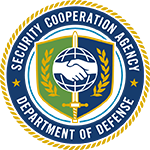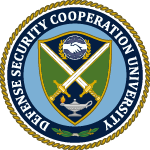Schoolhouse Hub
ISG’s Resident and Mobile Education provides military and civilian officials with unique education and professional development programs that support Security Cooperation and Institutional Capacity Building (ICB). ISG's tailored education and professional development courses help build a comprehensive knowledge base and strengthen partner capacities to confront complex security and defense challenges. Courses are designed to cultivate individual understanding of complex issues; foster peer-to-peer learning; and build international communities of practice. In the Schoolhouse information Hub, you will find descriptions of ISG Educational Portfolios and course descriptions related to each Portfolio. All items featured on this page are downloadable, printable, and shareable. Please check back frequently, as schedules and course listings may change.
Implementation Modes
Three course implementation modes are offered by ISG, denoted by a unique MASL number.
RESIDENT
2-4 week multilateral courses primarily conducted at ISG headquarters in Monterey, California. Delivered in adult learning style, courses feature lectures, breakout groups, interactive exercises, and student-led presentations. Limited to 30 students per course.
REGIONAL
1-2 week multilateral courses where one partner serves as a host to the ISG instructional team as well as students from other countries in the region. Courses are tailored to the regional context, and participant composition varies by topic and delivery method.
MOBILE
Mobile Education Teams (METs) conduct 1-2 week bilateral courses in partner countries. Courses are tailored to the national and regional context, and participant composition varies by topic and delivery method.
ISG Education Portfolios
Security Governance and Civil-Military Relations (SG/CMR)
The Security Governance and Civil-Military Relations (SG/CMR) focus area at ISG explores the relationship between elected civilians, civil society, and national security institutions (armed forces, police forces, and intelligence agencies) in a democratic context. It offers courses, seminars, and workshops that promote healthy civil-military relations and prepare participants with the knowledge and skill sets to develop whole-of-government approaches to address ever-evolving national security challenges.
Cyber Capability (CYBER)
Designed to build partner capacity and capability, ISG Cyber Capability courses explore policies and practices enabling countries to achieve, maintain, and excel with advantages over actors who seek to exploit, disrupt, or destroy the networks and systems upon which our societies and militaries depend. This portfolio highlights the importance of effective cyber defense for mission assurance that enables economic growth and innovation, examines barriers to effective policy and practice development, and considers methods for multi-domain response that represent a comprehensive approach for cyber defense. These courses address the fusion of cyber operations with cyber-focused intelligence, force planning and development, critical infrastructure, and systems acquisition along with the integration of cyber capabilities into multi-domain, joint, and combined operations. ISG cyber courses prepare decision-makers and their trusted experts to more effectively analyze, design, and implement policies and practices for safeguarding national cyberspace. Courses in this portfolio are delivered in partnership with leading defense and civilian educational entities.
Emergency Management and Resilience (EM&R)
The Emergency Management and Resilience (EM&R) portfolio designs and delivers comprehensive, whole-of-government courses and engagements focused on all-hazards emergency preparedness, resilience, and response. These efforts address emergency management and national hybrid threats as distinct yet mutually reinforcing focus areas. Courses and engagements aim to enhance civil-military cooperation, strengthen capacity in emergency preparedness, and foster a comprehensive approach to emergency management that integrates civilian government, military, and civil sector stakeholders, as well as the receipt and management of international disaster assistance. These national-level, leader- and planner-oriented courses are led by teaching teams comprised of ISG faculty, multi-disciplinary subject matter experts, and field practitioners.
International Defense Acquisition Resource Management (IDARM)
International Defense Acquisition Resource Management (IDARM) activities are designed to strengthen defense acquisition decision-making, and help nations understand and adopt modern business practices. The IDARM portfolio offers a wide range of courses focused on defense acquisition, contract management and negotiations, and defense project management. Courses can cover a range of interrelated subjects, providing defense leaders with the opportunity to explore strategic issues that must be addressed to improve their country’s defense acquisition business practices. Course offerings are developed in conjunction with faculty and specialized subject matter experts, and are tailored to the specific government organizational structures, national acquisition statutes and regulations, and defense acquisition objectives.
Logistics Capability Building (LCB)
The Logistics Capability Building (LCB) portfolio works with participants to increase the professionalization of their logistics forces to better sustain defense and security force capabilities. LCB activities help participants assess their logistics requirements more effectively and apply lessons learned within the partner’s unique context. Emphasis is placed on the need to integrate other institutional capabilities such as strategy, policy, and plans, and human resource management.
Learning methodologies include case study presentations, lectures, small group exercises/activities, and structured discussions.
Maritime Security (MARSEC)
Maritime Security (MARSEC) courses provide participants with the tools required to prevent and respond to myriad maritime security threats and challenges. MARSEC courses introduce and explore – at the strategic and operational levels – best practices and innovative solutions to address common challenges. Examples include understanding transnational maritime threats; enhancing maritime domain awareness capabilities; developing a maritime security strategy; integrating civil, military, and law enforcement agencies with maritime security responsibilities; and leveraging regional and other international governmental and non-governmental resources. ISG’s approach includes expert-led lectures, case studies, risk assessment, maritime governance, strategy development and tabletop exercises (TTX), a visit to a local U.S. Coast Guard station, and an emphasis on interagency and multi-national solutions.
Peacekeeping, Conflict, and Terrorism (PCT)
The Peacekeeping, Conflict, and Terrorism (PCT) portfolio conducts or contributes to educational courses and capacity building projects. Instructional topics cover causes of conflict and the full spectrum of conflict management, including prevention, various types of warfare, conflict resolution, peacekeeping, and governmental/societal recovery. PCT activities help governments gain an actionable understanding of both conflict dynamics as well as approaches to building capabilities and strategies to avoid or prevail in these situations. The faculty team possesses expertise in United Nations (UN) and regional organization peacekeeping operations, ethnic and religious identity conflict, combating terrorism and counterinsurgency, civil-military operations, and human security in complex crises. PCT peacekeeping activities build partner nation peacekeeping training capabilities, curriculum, and staff to better contribute to worldwide peace operations. These courses focus on leadership, staff, and UN specialized roles as well as the training of trainers. This approach is highly tailorable and prioritizes collaborative and iterative instruction side by side with national training center staff.
Course Materials
This section contains resources related to the Institute's educational programming offered in resident, regional, and mobile formats. Here you will find details surrounding both the content and timing of these offerings.
Course Catalog
This Course Catalog outlines the Institute’s varied course curricula, organized in the following education portfolios: Security Governance & Civil-Military Relations; Cyber Capability; Emergency Management & Resilience; International Defense Acquisition Resource Management, Logistics Capability Building; Maritime Security; and Peacekeeping, Conflict & Terrorism.
Course Description Sheets
The Schoolhouse Information Hub is the most complete public resource for ISG course information. The tables on the Schoolhouse Information Hub page display our offerings according to our functional areas. Click the titles within the tables to display and print our course description sheets.
FY25 Resident Course Calendar
The course offerings in the FY2025 Resident Course Calendar are conducted at ISG Headquarters in Monterey, CA. The two to four week short course offerings span the Security Governance & Civil Military Relations; Cyber Capability; Emergency Management & Resilience; International Defense Acquisition Resource Management; Logistics Capability Building; Maritime Security; and Peacekeeping, Conflict & Terrorism education portfolios.
FY26 Resident Course Calendar
The course offerings in the FY2026 Resident Course Calendar are conducted at ISG Headquarters in Monterey, CA. The two to four week short course offerings span the Security Governance & Civil Military Relations; Cyber Capability; Emergency Management & Resilience; International Defense Acquisition Resource Management; Logistics Capability Building; Maritime Security; and Peacekeeping, Conflict & Terrorism education portfolios.
Campus Map
Locate us at ISG headquarters by following this map from Naval Support Activity Monterey. The map also includes directions to other useful services. Note that ISG resides on secure US government property. Access must be arranged in advance.
For complete directions on how to get to ISG, go to the Visit section of this website.






